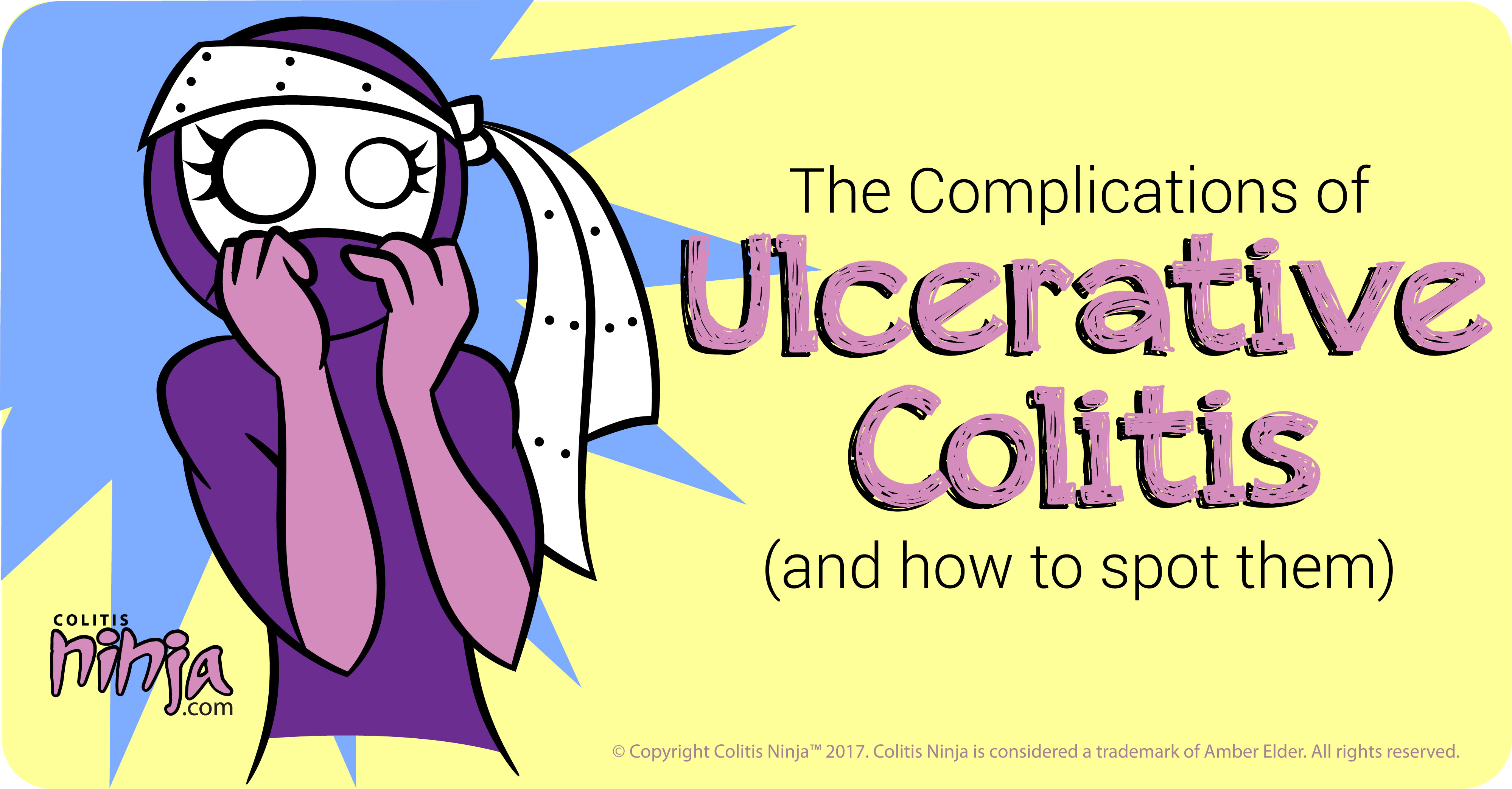
Complications of Ulcerative Colitis
(and How to Spot Them)
Living with Inflammatory Bowel Disease is an adventure all by itself. You never know from one day to the next how your day is going to go or what surprises await you. I thought it might be helpful, particularly for new patients, if I wrote a two-part series of complications that can occur with IBD and how to spot them. This week, we take a look at ulcerative colitis. Next week, we will take a look at Crohn’s disease. Of course, there are times that the two diseases can merge and crossover with the various complications. In other words, just because UC is more prone to severe bleeding than Crohn’s, doesn’t mean Crohn’s patients can’t experience it, too.
Anemia
Approximately 3.5 million Americans deal with anemia. Women and people with chronic illnesses have a higher risk of anemia. So what is anemia? Basically, it’s when your body is deficient in red blood cells or blood with plenty of iron. Anemia prevents oxygen from flowing through your body properly which, according to everyday HEALTH, causes your body to suffocate.
Patients with ulcerative colitis are particularly prone to anemia due to ulcerating, bleeding, colons. In severe UC, blood loss can happen rapidly. For me, there were times when bowel movements produced nothing but dark red blood clots in the bottom of the toilet.
Warning Signs
Here are some things that you should look for if you suspect that you are experiencing severe blood loss.
- fatigue
- unusually rapid heartbeat
- shortness of breath
- headache
- difficulty concentrating
- dizziness
- pale skin
- leg cramps
- insomnia
Perforated Colon
A perforated colon is a hole or rip in the colon that forms due to severe inflammation. Colon perforation can be extremely serious and even deadly if not caught early. The reason colon perforation is dangerous is because of the risk of sepsis from waste leaking into the abdominal cavity.
Warning Signs
When you have ulcerative colitis, it can be difficult to distinguish the warning signs from normal disease symptoms. Therefore it is extremely important for you to pay close attention to your body. If you are experiencing any of the following warning signs, you should go to the ER immediately.
- severe abdominal pain/cramping
- bleeding
- chills
- severe nausea
- fever
- loss of appetite
- vomiting
Severe Dehydration
Dehydration can occur at any age. We are always losing water from sweat, urination, water vapor in the breath and for patients with UC, watery stools and vomiting. It is extremely important for patients to stay on top of their water intake.
Warning Signs
If you feel like you might be experiencing severe dehydration, seek medical attention. Your doctor may need to give you fluids intravenously.
- increased thirst
- dry mouth
- weakness
- dizziness
- heart palpitations
- confusion
- fainting
- dark/decreased urine output
Toxic Megacolon
While Toxic Megacolon is rare, it is also life-threatening and should be taken seriously. Because of the nature of ulcerative colitis, patients have an increased risk for developing Toxic Megacolon. Toxic Megacolon is the swelling, dilation and expansion of the colon. When this happens, it prevents the colon from moving gas and feces from the body which builds up and can cause perforation.
Warning Signs
Again, it’s extremely important that you are aware of your body and what’s going on so that you can get the medical attention you need in a timely manner.
- swelling of the abdomen
- belly pain
- fever
- rapid heart rate
- shock
Blood Clots
Simply put, a blood clot is a “clump” of blood that changes from a liquid state to a gel or semi-solid state. Our blood was designed to clot so that we won’t bleed to death, but when a clot forms in our veins, it has the potential of being life-threatening. The most common blood clots occur in the legs, but they can also form in your arms, pelvis, lungs and brain.
Warning Signs
Again, if you suspect that you are experiencing a blood clot, please seek medical attention immediately. Blood clots can be extremely deadly.
Leg Blood Clot
- swelling
- pain
- tenderness
- warm to the touch
- pain in your calf while stretching
- pale or bluish color
Heart Blood Clot
- chest pain
- shortness of breath
- lightheadedness
Abdominal Blood Clot
- severe abdominal pain
- vomiting
- diarrhea
Brain Blood Clot
- sudden severe headache
- difficulty breathing
- difficulty speaking
Lung Blood Clot (pulmonary embolism)
- sudden shortness of breath
- chest pain
- heart palpitations
- breathing problems
- coughing up blood
In Conclusion
Again, it is important to know the warning signs of any and all complications that are associated with IBD. Which is also why it’s important to have a good relationship with your doctor and keep him or her informed of anything that may be concerning you. Your doctor cannot help you if you do not keep him informed of what’s going on and sometimes it could be a matter of life or death!
SOURCES:
“Complications of Inflammatory Bowel Disease.” Overview, Intestinal Complications, Extraintestinal Complications. Medscape, 27 Mar. 2017. Web. 28 Mar. 2017.
“Understanding Anemia — Symptoms.” WebMD. WebMD, n.d. Web. 28 Mar. 2017.
“Understanding Anemia — the Basics.” WebMD. WebMD, n.d. Web. 28 Mar. 2017.
Sanders, Linda. “Home.” Colon Health Magazine. Colon Health Magazine, 09 Nov. 2015. Web. 28 Mar. 2017.
“Dehydration in Adults.” WebMD. WebMD, n.d. Web. 28 Mar. 2017.
“Toxic Megacolon.” Toxic Megacolon | Johns Hopkins Medicine Health Library. Johns Hopkins Medicine, n.d. Web. 28 Mar. 2017.



